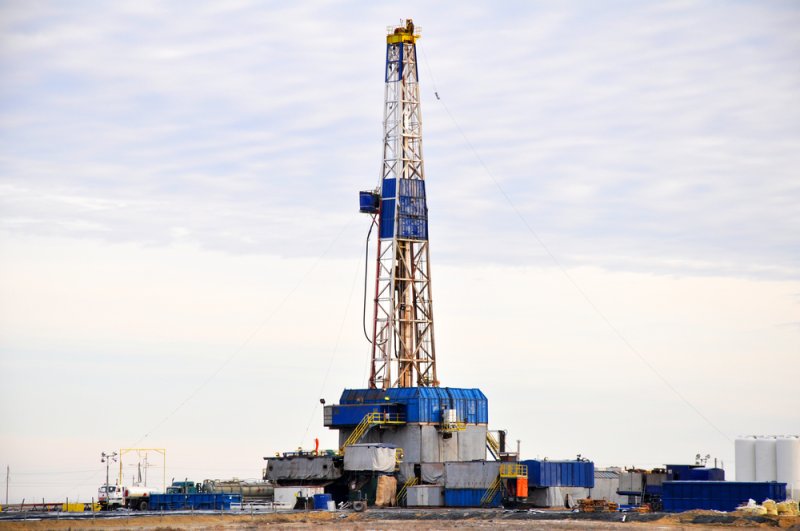 One of the nation's most recognizable names in climate science, Dr. James Hansen, released a new paper this week warning that even 2 degrees Celsius of global warming may be "highly dangerous" for humanity.
One of the nation's most recognizable names in climate science, Dr. James Hansen, released a new paper this week warning that even 2 degrees Celsius of global warming may be "highly dangerous" for humanity.
The paper, which will be published online in the European Geosciences Union journal Atmospheric Chemistry and Physics Discussion later this week, projects sea levels rising as much as 10 feet in the next 50 years.
Former Top NASA Scientist Predicts Catastrophic Rise In Sea Levels
Can Simply Living Near a Fracking Site Send You to the Hospital?
 People living near "unconventional gas and oil drilling" operations were more likely to be hospitalized for heart, nervous system, and other medical conditions than those who were not in proximity to those sites, a new study published Wednesday has found.
People living near "unconventional gas and oil drilling" operations were more likely to be hospitalized for heart, nervous system, and other medical conditions than those who were not in proximity to those sites, a new study published Wednesday has found.
It's the latest—and most comprehensive—indication that hydraulic fracturing, the controversial shale gas drilling method also known as fracking, and all the "noise, the trucks, the drilling, the flaring, the anxiety" it brings may have impact on residents in nearby areas, the study, titled Unconventional Gas and Oil Drilling Is Associated with Increased Hospital Utilization Rates, found—and the consequences hit more than their health.
Watchdog: EPA should do more on fracking chemicals
 The EPA’s internal watchdog recommended Thursday that it improve oversight of the chemicals used in hydraulic fracturing.
The EPA’s internal watchdog recommended Thursday that it improve oversight of the chemicals used in hydraulic fracturing.
Specifically, the EPA’s Office of Inspector General (OIG) said the agency needs to crack down on the unlicensed use of diesel fuel in fracking and figure out whether to mandate public disclosure of fracking chemicals.
Oil companies played hardball in bid to defeat climate outsiders
Petty legal filings. Diversionary ballot measures. Counting abstentions as no votes. These are just some of the tactics U.S. oil companies used this spring to quash efforts by investors to win the right to nominate climate experts for board seats.
Led by New York City Comptroller Scott Stringer and proposed at 75 U.S. companies in various industries this year, the so-called proxy access measure would give investor groups who own 3 percent of a company for more than three years the right to nominate directors. At the 19 oil and gas companies targeted, the aim was to demand more accountability on global warming.
Society calls for Scottish fracking review
 Hydraulic fracturing in Scotland could give the Edinburgh government some autonomy over the energy sector with few environmental impacts, a policy paper read.
Hydraulic fracturing in Scotland could give the Edinburgh government some autonomy over the energy sector with few environmental impacts, a policy paper read.
The Royal Society of Edinburgh, the premier scientific academy in Scotland, said the controversial drilling practice known also as fracking offers Scotland important options for onshore natural gas.
A child born today may live to see humanity’s end, unless…
 Humans will be extinct in 100 years because the planet will be uninhabitable, said the late Australian microbiologist Frank Fenner, one of the leaders in the effort to eradicate smallpox during the 1970s. He blamed overcrowding, denuded resources and climate change.
Humans will be extinct in 100 years because the planet will be uninhabitable, said the late Australian microbiologist Frank Fenner, one of the leaders in the effort to eradicate smallpox during the 1970s. He blamed overcrowding, denuded resources and climate change.
Fenner’s prediction, made in 2010, is not a sure bet, but he is correct that there is no way emissions reductions will be enough to save us from our trend toward doom. And there doesn’t seem to be any big global rush to reduce emissions, anyway. When the G7 called on Monday for all countries to reduce carbon emissions to zero in the next 85 years, the scientific reaction was unanimous: That’s far too late.
Scientists say global warming doesn't decrease winter mortality rate
 A new study from Columbia University's Mailman School of Public Health disproves the assumption that increased global warming will decrease the amount of winter-related deaths around the world.
A new study from Columbia University's Mailman School of Public Health disproves the assumption that increased global warming will decrease the amount of winter-related deaths around the world.
Researchers analyzed temperature and mortality data from 39 cities in the U.S. and France and concluded that a warmer climate has little if any correlation to weather-related mortality rates during winter months.
More Articles...
Page 29 of 201

 Environmental Glance
Environmental Glance






























